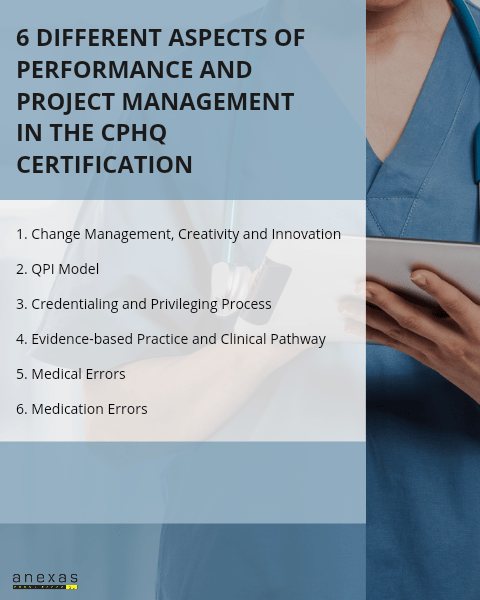Performance and Project Management in CPHQ
We all know that CPHQ or Certified Professional of Healthcare Quality is a certification for Healthcare Professionals and that it is one of the most important ones too. However, before going for any kind of certification, an individual must know what he/she/they will learn and what all topics will be covered. In this article, you will learn about one of the modules that CPHQ certification includes.

Anexas provides CPHQ training for healthcare professionals under NAHQ and one of the modules covered in the training program is CPHQ certification- Performance and Project Management. There are different aspects covered under this module which are important to get a proper understanding of, before going through the training. This module helps to identify the opportunities for improvement and the implementation and evaluation of those opportunities.
The training module of CPHQ Certification- Performance and Project Management can be broadened into 6 different topics- Change Management, Creativity and Innovation, QPI Model, Credentialing and Privileging Process, Evidence-based Practice and Clinical Pathway, Medical Errors and Medication Errors.
Let’s see the 6 different aspects of Performance and Project Management in the CPHQ Certification

1. Change Management, Creativity and Innovation
The change or diversity in an organization can bring an environment of Creativity and Innovation to the workplace. It can bring competitiveness to employees and can better the quality standards of the organization overall. However, it can also bring conflicts in agreements at certain points and low morale which is again directly proportional to the quality and can make the organization face a downfall. Management the change and diversity is, therefore, very important as it can determine the future standards of the organization holds. A person who has developed good leadership skills will be a good preference for managing the change and bringing the creativity and innovation from each member of the team. CPHQ helps understands these changes and delivers how to bring the best out of them.
2. QPI Model
QPI or Quality and Performance Improvement Model is a model adopted by healthcare organizations to implement high-end processes to achieve the improvement in the quality and performance of healthcare services and pursuits. Performance Improvement is the constant adaptation of different processes and how they can be useful to meet the needs of patients. Quality Improvement is, on the other hand, quite statistical and is the analysis of data on current healthcare practices to identify the errors and thereby solve problems of the practices. Both Quality and Performance Improvement together brings change to the workspace because of the process analysis for quality and the adaptation of new techniques for performance. This will reduce the errors in processed and raise the standards of an organization.
3. Credentialing and Privileging Process
Credentialing is the process of monitoring and accessing deeply to confirm the qualifications of a healthcare professional. It determines, if someone, who is providing healthcare services is actually qualified for the role and is good for patient safety. Privileging, on the other hand, is the assessment of the institutions or organizations which determines if the professional providing healthcare services has followed all the regulations of having the organization or the institution. Credentialing and Privileging together is a very complex process and can be difficult for professionals, keeping in mind the extensive prospects of new practices, changes in protocols and regulations etc. Credentialing and Privileging should be considered even when an organization hires new professionals for certain job roles and the individual should be having a good understanding of the responsibilities. One wrong hire could instantly cause a loss to the organization’s standards and privileging of it as a whole.
4. Evidence-based Practice and Clinical Pathway
Evidence-based practice is a concept or approach which involves quality decision-making based on an individual’s own experiences and practices along with the most relevant and recent research on the same situation. The main aim of Evidence-based practice is to provide the best healthcare services to patients while considering it to be cost-effective for both patients and the organizations. It is used to review, analyze and implement the best research on any practice along with the individual’s experience and knowledge and the patient’s preferences. Clinical Pathways are tools which help in the study and implementation of evidence-based practices. The main aim of Clinical Pathways is to understand the evidence-based practices and implement them in the healthcare process along with the consideration of the uniqueness in the culture, staff and the vision of each organization. It plays an important role in patient safety and improvement of the quality.
5. Medical Errors
Medical Errors are very difficult to be neglected as they can cost from small damage to huge damage to the standards of quality of an organization and its processes. The medical errors that are commonly seen are errors in the identification of the disease, hence resulting in wrong treatment or injuries while a patient undergoes any treatment or surgery or worst-case scenario, any mortality due to the error in the treatment of a patient. These factors can rapidly pull down the name and the bar of standards any healthcare organization possess and can result in losing the trust and confidence of people relying on the organization. Identifying and understanding these errors are one of the most important aspects any healthcare organization needs to consider.
6. Medication Errors
Medication Errors are based on the errors resulting from the actions of doctors or pharmacists while prescribing medications to patients. Just like Medical Errors, these also can be fatal to patients and can drastically change the standards of an organization as well the professional. The uttermost importance needs to be given to the identification and removal of these errors if an organization wants to have good Performance Management.
Conclusion
As a whole, performance and project management plays quite an important role in upbringing the organization’s standards. Anexas’s training program will guide you in-depth on the different parts of CPHQ Certification- Performance and Project Management. All you need to do is register and get trained with Anexas.
Also read: CPHQ- Patient Safety





